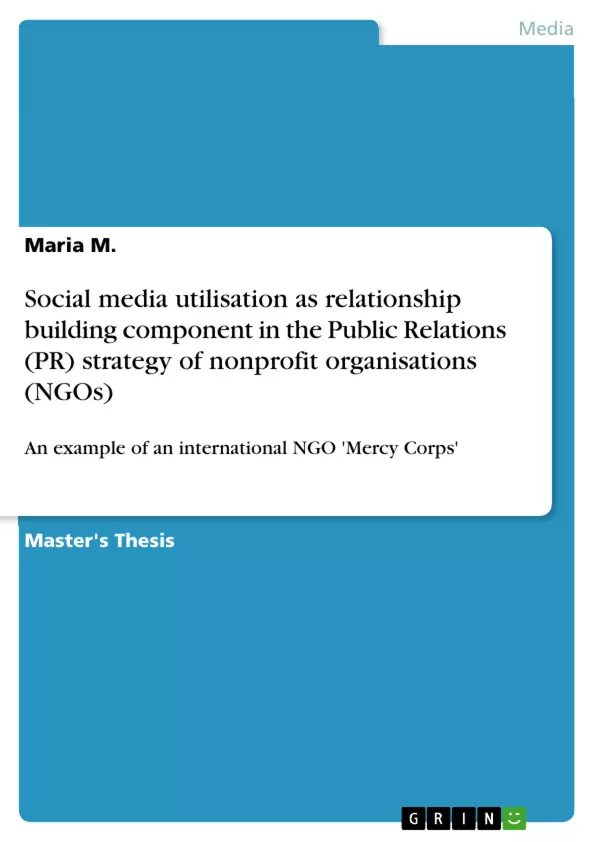The developments in the digital word introduced new communications channels in the Public Relations (PR) work, which encompass technologies such as social networking. PR
and communications practitioners generally accept this development as an advantageous phenomenon. However, recent research on social media has shown that the PR industry in the nonprofit sector lacks a full integration of new media to its full extent in order to be more efficient. Limited research has been carried out to explore the challenges in the adoption of social media channels in this particular sector.
This study sought to explore the experiences and perceptions on the process of social media integration in an international NGO. By using the findings of semi-structured interviews of the staff and that of the content analysis of the deployed social media channels, it aims to investigate the effect of social media communication on the relationship building with the supporters through dialogue.
The study revealed that different concepts such as dialogical communication and relationship building have enormous value within the online PR work in organisations. The new online platforms can be used for building relationships with stakeholders by embracing two-way communication which leads to a mutual understanding and commitment from the donors.
It seemed that strategic social media adoption is also dependant on the organisational culture and power structures in it. Providing for a different understanding of organisational goals and the value of social media on the management level can marginalise a successful contribution of these channels to the strategic communications and fundraising work.
The conclusions from this research represent a broad theoretical framework for further research into the effects of social media on successful PR practice in NGOs on a local, national and international level.
Inhaltsverzeichnis (Table of Contents)
- Introduction
- Literature review
- Literature review introduction
- Dialogical communication
- What is dialogue?
- Dialogue from a communication perspective
- Dialogical communication within PR
- Relationship management
- Definition of relationship management
- Relationship management from the PR perspective
- Dialogue and relationship management
- Internet, new media and social media
- Dialogic principles in online relationships
- Relationship management in and through social media
- Social media use of NGOs, relationships and dialogue
- Literature review summary
- Methodology
- Methodology introduction
- Aims and research questions
- Research strategy
- Methodology
- Research approach
- Sampling
- Data collection or methods
- Interview
- Content analysis
- Authencity and trustworthiness
- Ethical considerations and limitations
- Findings and discussion
- Findings and analysis introduction
- Presentation of the findings
- Mercy Corps European Headquarters
- Mercy Corps US Headquarters
- Discussion and analysis
- Relational antecedents
- Understanding of social media
- Power within internal structures
- Relational maintenance
- Dialogue
- Trust and accountability
- Relational outcomes
- PR and social media
- Control mutuality
- Satisfaction
- Relational antecedents
- Summary discussion
Zielsetzung und Themenschwerpunkte (Objectives and Key Themes)
This study aims to investigate the integration of social media into the PR and communications work of NGOs, using Mercy Corps as an example. It explores the relationship between social media utilization and the adoption of dialogical communication for relationship building with supporters.
- The role of social media in building relationships with stakeholders in the nonprofit sector
- The impact of dialogical communication on relationship management in online PR
- The challenges and opportunities of integrating social media into the strategic communication and fundraising efforts of NGOs
- The influence of organizational culture and power structures on social media adoption
- The potential of social media to enhance transparency, accountability, and trust between NGOs and their supporters
Zusammenfassung der Kapitel (Chapter Summaries)
The study begins with a comprehensive literature review examining dialogical communication, relationship management, and the role of new media in building online relationships. It explores the specific context of social media use by NGOs and its potential to foster dialogue and engagement with supporters. The methodology section outlines the research approach, data collection methods (including interviews and content analysis), and ethical considerations. The findings and discussion section presents the results of the study, analyzing the experiences and perceptions of Mercy Corps staff regarding social media integration and its impact on relationship building. The study concludes by discussing the implications of the findings for PR practice in NGOs and highlighting recommendations for future research.
Schlüsselwörter (Keywords)
This research focuses on the intersection of social media, Public Relations, and nonprofit organizations. Key terms include dialogical communication, relationship management, stakeholder engagement, social media integration, fundraising, organizational culture, and the case study of Mercy Corps.
Frequently Asked Questions
How can NGOs benefit from using social media in PR?
Social media allows NGOs to engage in two-way dialogical communication, building stronger relationships with supporters, increasing transparency, and enhancing fundraising efforts.
What is dialogical communication in the context of online PR?
It is a communication style focused on mutual understanding and commitment through interaction, rather than just broadcasting information to an audience.
What are the challenges for NGOs when integrating social media?
Challenges include organizational resistance, power structures within the management level, and a lack of full integration of new media into strategic communication plans.
How does organizational culture influence social media adoption?
The culture and internal power structures determine how social media is valued; a lack of understanding at the management level can marginalize its effectiveness.
What was the focus of the Mercy Corps study?
The study explored how Mercy Corps uses social media to build trust and accountability with its stakeholders through dialogic principles.
- Citar trabajo
- Maria M. (Autor), 2012, Social media utilisation as relationship building component in the Public Relations (PR) strategy of nonprofit organisations (NGOs), Múnich, GRIN Verlag, https://www.grin.com/document/342569



